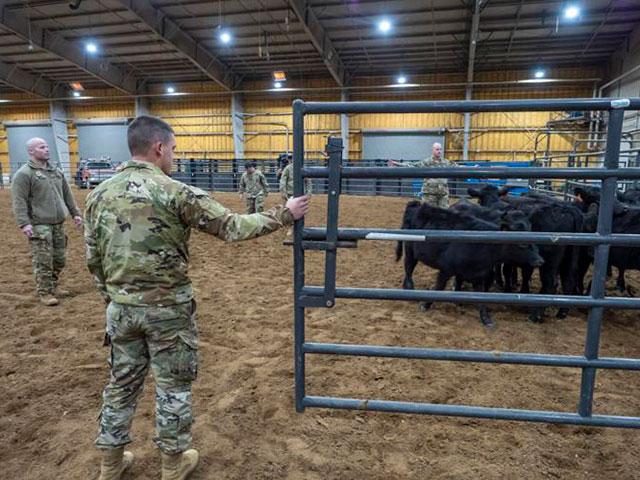Emergency Know-How
Army Reservists Train in Disaster Handling of Cattle and Horses
Oklahoma's Army reservists just completed some unconventional on-the-ground training that will help save the lives of countless cattle and horses during future disasters. The training, hosted by the Oklahoma State University Extension Disaster Assistance Response Team (DART), was aimed at preparing soldiers for a variety of emergency situations they could face both locally and on foreign soil.
"You can't forget the basics when you're in a disaster situation and they're not your animals," said Donna Patterson, agriculture and 4-H Extension educator for Rogers County. "Their behavior is going to be much different in a crisis. We want to ensure all animals and humans are safe."
That will prove valuable whether the reservists are called out to help with a rollover on a cattle truck, a fast-moving wildfire or an emergency in a foreign country where there are nervous, scared or injured livestock.
The reservists from the 486th Civil Affairs Battalion, based at Sand Springs, learned the basics like how to identify brands, colors and genders of horses and cattle. They learned to safely move a group of animals and how to halter a horse.
P[L1] D[0x0] M[300x250] OOP[F] ADUNIT[] T[]
"In a disaster, whether a tornado or fire, animals may be injured, and if overseas, there may be diseases present," explained Patterson. "It's important for first responders to identify a sick or hurt animal and understand basic first-aid and take biosecurity precautions."
Earl Ward, OSU Extension's northeast area livestock specialist, said they also explained flight zones for cattle to the reservists, demonstrating how to move cattle calmly and slowly. They discussed the key points of penning horses or cattle off a road.
Scott Stokes, director of Rogers County Emergency Management, works closely with the county Extension group and said he's seen firsthand how important this training can be.
"We experienced it in 2019, when we lost hundreds of cattle to flooding," he said. "If we'd been able to have the National Guard help us, we might have prevented some of that."
The OSU educators noted they hope to spread the training to the area's police, fire and first responders in the future.
"We're taking what we love as ag educators within OSU Extension and extending it to others," Ward said. "It's our role to provide this education, and with our presence in all 77 counties, we're the boots on the ground that can respond fast and help people become more comfortable around animals."
Victoria Myers can be reached at vicki.myers@dtn.com
Follow her on Twitter @myersPF
(c) Copyright 2022 DTN, LLC. All rights reserved.





